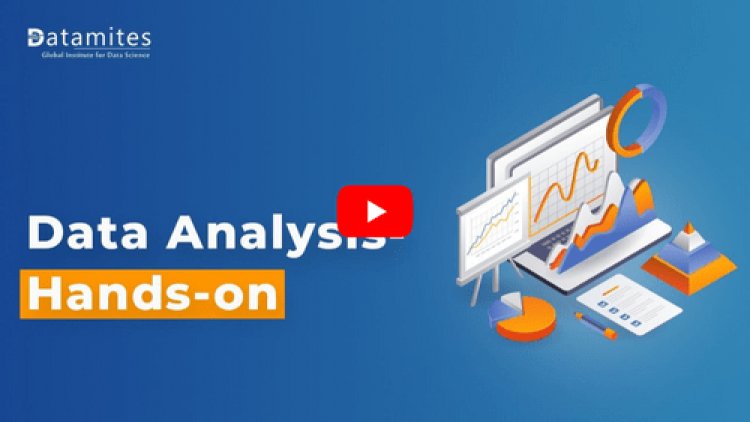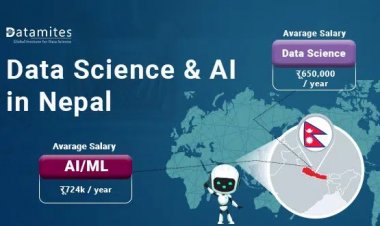How to Become a Data Analyst in South Africa?

Data analysis is a required field in today’s digital era, and its significance is rapidly growing across various industries and sectors. In South Africa, a country known for its rich cultural diversity, natural resources, and vibrant economy, data analysis plays a vital role in decision-making, problem-solving, and driving sustainable growth.
In South Africa, data analysts in Cape Town collaborate with organizations to work with diverse datasets, including customer demographics, market trends, economic indicators, and social data. Through their expertise in advanced statistical techniques, machine learning algorithms, and visualization tools, data analysts provide valuable insights to help organizations comprehensively understand their operations, customer behavior, market dynamics, and emerging opportunities.
Unravelling the Power of Data: Understanding the Essence of Data Analytics
is the process of examining and interpreting data sets to uncover meaningful patterns, draw insights, and inform decision-making. It involves the application of statistical and computational techniques to analyze large volumes of data and extract valuable information from it. Data analytics can be applied to various types of data, including structured data (such as databases and spreadsheets) and unstructured data (such as text documents, social media posts, and multimedia content.
Market Research Future report predicts significant growth of the data analytics market, with an estimated increase of USD 303.4 Billion by 2023, at an impressive compound annual growth rate (CAGR) of 27.60%. Data analytics enables organisations to make data-driven decisions, uncover hidden patterns and trends, identify opportunities and risks, and enhance overall efficiency and effectiveness in various domains.
Data Analytics Career in South Africa
A Data Analytics Career in South Africa offers several advantages, including competitive salaries in the field. Data Analytics professionals are in high demand as organizations increasingly recognize the value of data-driven decision-making. The U.S. Bureau of Labor Statistics predicts a significant growth rate of 25% for Data Analyst jobs from 2020 to 2030. With the growing importance of leveraging data to gain insights and drive business growth, companies are willing to invest in skilled professionals who can analyze and interpret complex data sets.
The salary range for Data Analysts in South Africa ranges from ZAR 294,292 per year according to a PayScale report. The salary depends on factors such as experience, qualifications, and industry. Entry-level positions typically offer competitive starting salaries, which can increase significantly with experience and expertise. Experienced professionals with a strong track record in Data Analytics can command higher salaries due to their ability to provide valuable insights and drive strategic decision-making.
Read the following articles:
- Data Analytics in Logistics
- Data Analytics in Business
- Data Analytics Influencing the Educational Sector
The Growing Demand for Data Analytics in South Africa?
Data Analytics is in high demand in South Africa across various industries, including education, healthcare, retail, manufacturing, and finance. There are several reasons why this demand exists:
- Education: Educational institutions in Johannesburg, South Africa, are at the forefront of recognizing the significance of data analytics in enhancing teaching methodologies, tracking student performance, and informing decision-making processes. By leveraging data analysis techniques, institutions can identify patterns, trends, and areas that require intervention, enabling the development of more effective educational strategies and ultimately improving outcomes for students.
- Healthcare: The healthcare industry in South Africa generates vast amounts of data, including patient records, medical images, and clinical trials. Data analytics helps healthcare providers gain insights from this information, leading to enhanced patient care, disease prevention, and optimized resource allocation. It can also support research efforts, such as identifying patterns in disease prevalence or predicting outbreaks.
- Retail: Retailers in South Africa are leveraging data analytics to gain a competitive edge in a rapidly evolving market. Analyzing customer data, sales figures, and market trends allows retailers to understand customer preferences, optimize inventory management, personalized marketing strategies, and improve overall operational efficiency. These insights enable them to deliver better customer experiences and make data-driven decisions.
- Manufacturing: The manufacturing sector in South Africa is becoming increasingly automated and data-driven. Data analytics plays a vital role in optimizing production processes, improving supply chain management, and ensuring quality control. By analyzing production data, manufacturers can identify bottlenecks, reduce downtime, and enhance productivity. Predictive analytics can also help them anticipate maintenance needs and prevent equipment failures.
- Finance: The finance industry relies heavily on data analytics to manage risks, detect fraud, and make informed investment decisions. Financial institutions in South Africa utilize analytics to assess creditworthiness, identify market trends, and personalized financial services. Additionally, regulatory requirements and anti-money laundering measures drive the demand for data analytics capabilities to ensure compliance and security.
In summary, the demand for data analytics in South Africa’s education, healthcare, retail, manufacturing, and finance industries is driven by the need for improved decision-making, enhanced operational efficiency, customer personalization, risk management, and compliance. Data analytics provides valuable insights from vast amounts of data, enabling organizations to stay competitive, improve outcomes, and drive growth.
Read the following articles:
- Become a Data Analyst in Australia
- Become a Data Analyst in Singapore
- Become a Data Analyst in India
Data Analyst Journey: Navigating the Path to Success in South Africa
To become a data analyst in South Africa, you can follow these general steps:
- Obtain a relevant degree: Most data analyst positions require a bachelor’s degree in fields such as mathematics, statistics, computer science, economics, or data science. Look for reputable universities or colleges in South Africa that offer these programs.
- Gain relevant skills: While pursuing your degree, focus on developing skills in statistical analysis, data manipulation, data visualization, programming languages (such as Python or R), and database management. Additionally, learn to work with popular data analysis tools and software like Excel, SQL, and data visualization tools like Tableau or Power BI.
- Gain practical experience: Enhance your learning by seeking internships, part-time jobs, or projects that involve data analysis. This practical experience will help you apply your knowledge and build a portfolio of projects to showcase your skills to potential employers.
- Obtain certifications: Obtaining relevant data analytics certifications, such as the Certified Analytics Professional (CAP) or Microsoft Certified: Data Analyst Associate can enhance your credibility and competitiveness in the job market. Data Analytics Certifications in South Africa validate your expertise and showcase your proficiency in data analysis.
- Live-project internship: Live project internships offer data analytics professionals valuable chances to apply their knowledge and skills to real-world data challenges encountered by organizations, gaining practical experience in the process. This hands-on experience provides them with a valuable opportunity to enhance their understanding and proficiency in data analytics.
- Resume Preparation: When crafting a resume for a data analytics position, it is crucial to emphasize relevant skills and experience. Give prominence to technical proficiencies, including programming languages such as Python and R, data querying expertise in SQL, and familiarity with analytics tools like Tableau and Power BI. Highlighting these technical skills will showcase your proficiency and suitability for the data analytics role.
- Job search and networking: Utilize online job portals, professional networking platforms (such as LinkedIn), and local job fairs to search for data analyst positions in South Africa. Network with professionals in the industry and consider reaching out to companies directly to inquire about potential opportunities.
- Prepare for interviews: Practice common data analyst interview questions and be prepared to discuss your technical skills, experience with data analysis tools, and your problem-solving abilities. Highlight your academic achievements, practical experience, and any relevant projects from your portfolio.
Remember that the path to becoming a data analyst may vary depending on the specific requirements of employers and industry trends. It’s important to continuously update your skills, stay informed about new developments in data analysis, and adapt to the changing demands of the field.
Empowering Data Analysts in South Africa: DataMites Certified Data Analyst Course
DataMites is a highly respected global training institute that provides wide courses like Python, Data Science, Artificial Intelligence, Deep Learning and data analytics training in South Africa. With a strong international presence, DataMites specializes in delivering high-quality training in the field of data analytics. Notably, their Certified Data Analyst Course in South Africa stands out as a unique opportunity for students to gain extensive knowledge and practical skills in the dynamic and evolving realm of data analytics.
Here are some general highlights about the data analytics course in South Africa provided by DataMites:
- Ashok Veda and the faculty: DataMites has gained an exceptional asset with the addition of Ashok Veda, a highly acclaimed AI expert, who brings an impressive 19-year history of expertise in analytics and data science. His extensive experience spans diverse industries like finance, healthcare, and technology, consistently delivering outstanding results and fostering innovation. As a distinguished member of the DataMites faculty, Ashok Veda leads cutting-edge AI projects, extracting valuable insights and solving complex business challenges. With a dedication to providing top-notch training and staying up-to-date with AI advancements, DataMites ensures students receive exceptional guidance from Ashok Veda.
- Project and Internship Opportunities: At DataMites, students are provided with valuable opportunities to participate in projects and internships, allowing them to gain hands-on experience and apply their skills in real-world scenarios. These experiences contribute significantly to their understanding of data analytics as they tackle industry-specific challenges and engage in practical projects. By actively involving themselves in these opportunities, students can enhance their comprehension of the field and cultivate valuable problem-solving abilities.
- Industry-relevant Tools: DataMites ensures that students have access to industry-relevant tools, including licensed software and widely used applications like Excel, SQL, Tableau, Power BI, and others. The curriculum emphasizes practical experience and expertise through hands-on exercises and real-world projects. This integration of tool accessibility and practical applications equips students with essential industry-specific skills and proficiency in utilizing relevant tools.
- Flexibility: DataMites provides students with flexible training options, including exclusive Online Data Analytics Training in South Africa, enabling them to choose the learning mode that aligns with their convenience and preferences.
- Course Content: DataMites would have a structured curriculum that covers essential concepts and skills required for data analysis. This may include topics such as data manipulation, statistical analysis, data visualization, programming languages (Python or R), machine learning, and data mining.
- Hands-on Projects: DataMites offers a practical experience through hands-on projects and case studies, enabling students to apply their knowledge and skills to real-world scenarios and gain valuable practical exposure. This practical experience helps learners understand how to analyze data effectively and solve data-related problems.
- Certification: Upon successful completion of the course, DataMites provide an Internationally recognised IABAC certification to acknowledge the skills and knowledge acquired by the participants. This certification can be valuable when applying for data analyst positions or advancing in your career.
- Affordable fees: DataMites places a strong emphasis on making quality education in the field of data analytics accessible to all by providing affordable fees for its courses. They offer cost-effective options without compromising on the high-quality content and enriching learning experience they provide. The Certified Data Analyst Training fees in South Africa is available at a range of ZAR14,552 to ZAR 26,390 for students to choose from.
Certified Data Analyst Course

Summary:
In conclusion, pursuing a career as a data analyst in South Africa presents both opportunities and challenges. The country’s increasing focus on data-driven decision-making and a thriving economy creates a demand for skilled professionals. However, challenges such as data quality, shortage of highly trained analysts, and concerns about data privacy need to be addressed. By undertaking Certified Data Analyst Training Courses in South Africa, professionals can equip themselves with the necessary skills to overcome these obstacles. Despite the challenges, the government’s investment in data science and the flourishing tech startup ecosystem offer a promising future for data analysts. By staying updated, fostering collaboration, and upholding ethical standards, data analysts can make significant contributions to organizational success and drive innovation in South Africa.
Read the following articles:
- Become a Data Analyst in Canada
- Become a Data Analyst in United States
- Become a Data Analyst in Thailand
Data Analyst vs Data Engineer

Learn Data Analysis with the Help of Python






